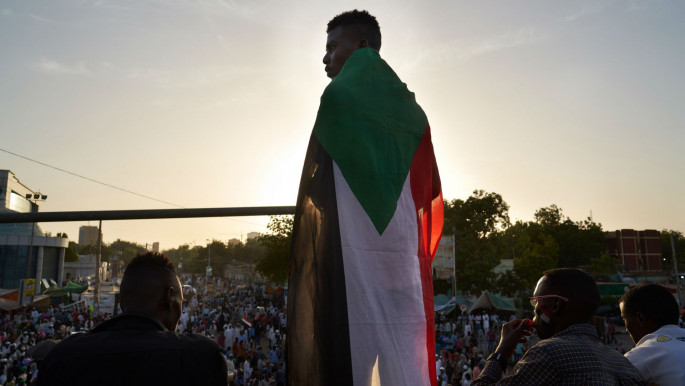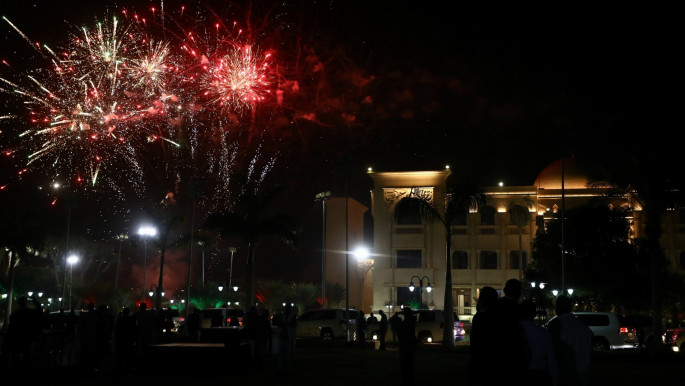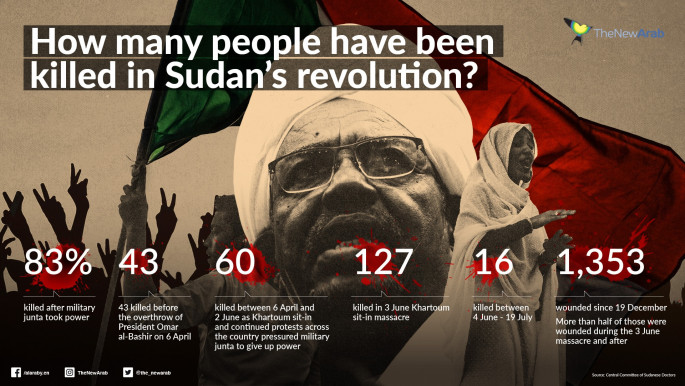Sudan: How revolutionaries took over neighbourhood committees
It is the first urban planning project of the new local representatives; it was put forward and solely funded by donations from local inhabitants and business owners.
"Private sponsors got in touch with us, but we refused in order to stay free," Mohamed Bader, who sells both pure and spiced coffee, says gladly.
A symbolic victory on the old regime of Omar al-Bashir, who was planning on selling this rare empty space, along with the playground of the school facing it, to private investors dreaming of row upon row of shopping centres.
"The old neighbourhood committee organised corruption by selling bits of land to relatives and businessmen, without the state nor the citizens ever benefiting from it. Part of the public school's playground has already been cut off, but we cancelled the old regime's last projects by warning the capital's new governor," explains Shaheen al-Sherif.
 |
|
| Read also: One year after Bashir's downfall, Sudan's revolutionaries sleep with one eye open |
At 24, he was elected by around a hundred of Amarat's committed citizens to run one of the Sudanese capital's fifteen local "service and change committees". Along with two friends met during the revolution, this English and Computer Science teacher replaces the dozen infamous members of the former "Popular Committee".
This was one of the clientelist bodies which were dissolved on April 21, 2019, ten days after the fall of Omar al-Bashir; they were supposed to represent the state within the neighbourhood, while being appointed and run by the then ruling National Congress Party.
'We wanted to stand up to the regime by doing its job'
One year ago, the faltering regime was yet again playing the violent suppression card when Shaheen inadvertently established what would become the neighbourhood committee.
First, there were the secret meetings in his flat with a few close relations. Then, there was the cleaning of the waste-ridden streets.
"We wanted to stand up to Bashir's regime by doing its job – and even better – while he accused us of causing unrest. After witnessing our actual actions, a few dozen inhabitants joined us and others helped us financially," remembers the young man who had then only lived under the dictator's rule.
Once the kleptocrat was down, the small self-styled "resistance" committee expanded its activities: collective refuse bins were set up (and soon overflowing), Sudanese films were shown outdoors, and investigations were launched on the allegedly corrupt mosque and on the villa which was suspected of being a former secret prison.
In their new headquarters, a run-down club belonging to the Ministry of Youth, four women and a dozen men, with an average age not exceeding 30, are sitting in a circle on plastic chairs. After nightfall, the small assembly meets two students wearing black abayas: they are outraged at having been expelled from their boarding school for reporting the guards' spying and sexual blackmail.
"The ministry refused to help and called me a communist," says a furious Elham, who would rather not give her full name.
 |
|
| Read also: Sudan's year long march to democracy and reform |
Three decades of authoritarian Islamist administration will not vanish in a few months. The National Congress party was officially dissolved on November 29, but "universities and ministries are still full of 'kizans' (the members of the old regime)," affirms a student from the committee, who suggests organising a demonstration and a press conference with the support of the Sudanese Professionals Association (the association of trade unions at the heart of the rebellion against Bashir).
Patrols and free medicine
These core activists rely on 230 other ad hoc volunteers, gathered in a single WhatsApp group, and includes volunteers like Khaled Adel, the grill cashier who sometimes joins the committee's night patrol after work.
This male-only troop armed with a few sticks doesn't mean to replace the police, "but to help it do its job because there are not enough of them to cover all the streets, where insecurity has increased since the revolution," affirms the 26-year-old.
Coordinated by the local police and supported by the Sudanese Professionals Association, these patrols have greatly reduced the number of thefts according to the Amarat police station.
In the north-eastern suburbs of Khartoum, the new representatives of El-Haj Yousif, a large working-class district, are trying to make up for the failures of the dilapidated public health system.
A public school was requisitioned for days of free medical appointments and medicine distribution, with the support of the Doctors Syndicate.
Although the committee no longer receives public subsidies to give food to the poor like it used to, this social relief is now "offered to all and not only to the National Congress Party's favourites", points out Youssef Ahmed Saïd, speaker and member of the large El-Haj Yousif committee.
 |
|
More space for women?
The 26-year-old representative goes on to say that this assembly of 50 elected members "was entirely refreshed with newcomers from all social classes, nearly half of whom are women, when they had no role in the old committee" – maybe slightly pushing it, to stick to the widespread image of the women-led Sudanese revolution.
"The new political regime is going to find legitimacy in radically opposing the old; the role of women is a symbolic leitmotif of this. However, women were also part of the old regime," says researcher Lucie Revilla.
She has studied the evolution of neighbourhood committees after the fall of Bashir, in which "organisation is still done by men, who also monopolise representation roles, while women take charge of domestic tasks related to the committee's internal functioning and where their political work is more invisible".
Neighbourhood committees resemble the transition to democracy, which should end in August 2022 with the organisation of elections.
Both are still in their infancy, and create long awaited collective momentum.
To the naysayers and too persistent journalists, the members willingly repeat that "the revolution hasn't succeeded, because it hasn't yet begun."





 Follow the Middle East's top stories in English at The New Arab on Google News
Follow the Middle East's top stories in English at The New Arab on Google News


